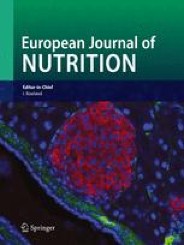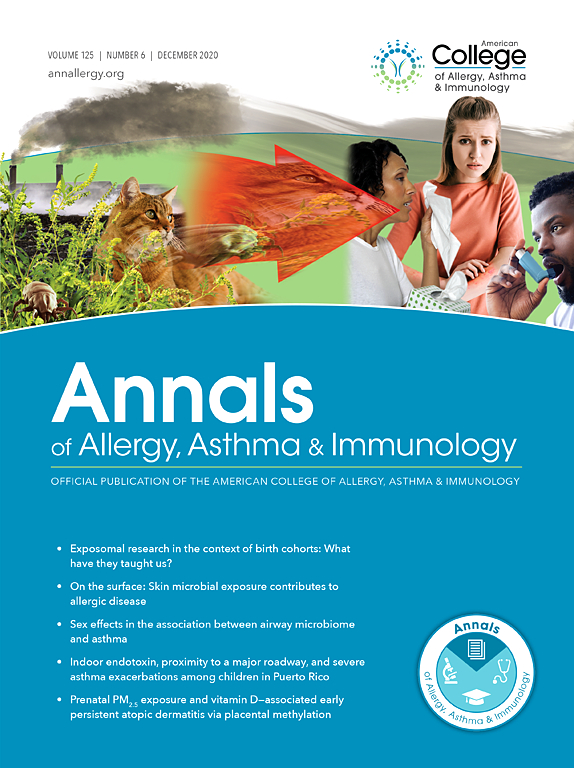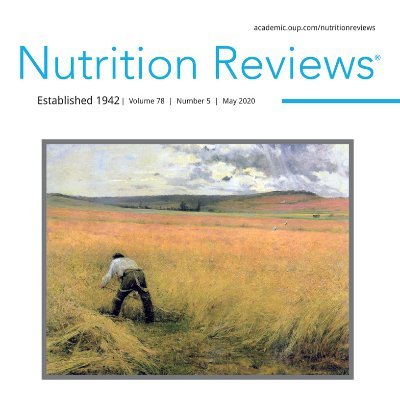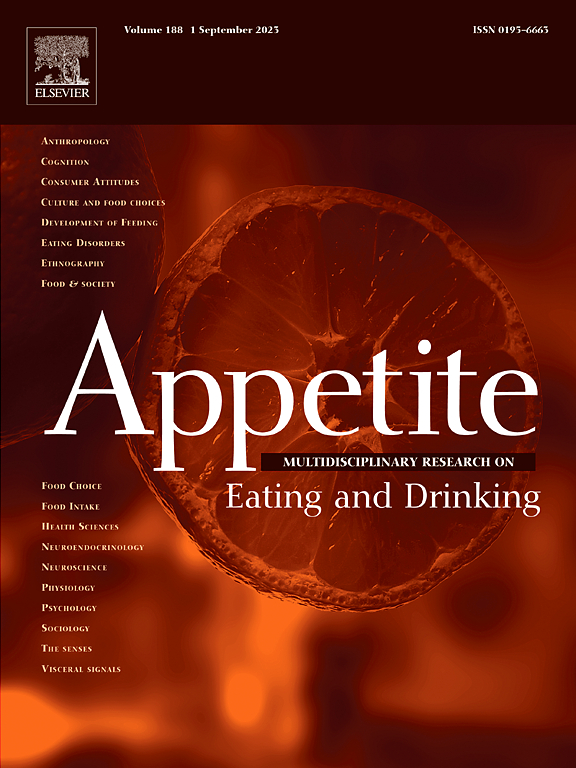Satiety
How to submit an article:
- Registered users can submit any published journal article that has a unique DOI (Digital Object Identifier) name or link to Research Hub.
- For example, you can paste the full DOI link:
https://doi.org/10.1109/5.771073or just the DOI name:10.1109/5.771073into the field above and click submit. - The person who is first to submit a valid article to Research Hub will forever be credited for it, and every article submission earns you +6 Research Points.
Published research studies are articles that present the findings of original research that has undergone a peer-review process and has been made publicly available in scholarly journals, books or other media.

Glycemic response, satiety, gastric secretions and emptying after bread consumption with water, tea or lemon juice: a randomized crossover intervention using MRI
2022 Jan 11 European Journal of Nutrition Freitas D, Boué F, Benallaoua M, Airinei G, Benamouzig R, Lutton E, et al.
Randomised Controlled Trial Gastric Emptying Blood Sugar LemonLemon juice boosts gastric secretions and emptying rate, and reduces blood sugar response to starchy food, potentially due to acid-inhibition of digestion enzyme in saliva.

Effect of dietary supplementation with oat β-glucan for 3 months in subjects with type 2 diabetes: A randomized, double-blind, controlled clinical trial
2021 Feb Journal of Functional Foods Pino JL, Mujica V, Arredondo M
Randomised Controlled Trial Gut Microbiota Satiety HbA1C Type 2 Diabetes Blood Sugar OatsEnriching a regular diet with oat β-glucan can improve glycemic control, augment feelings of fullness, and positively modulate gut microbiota in individuals with type-2 diabetes.

Effect of Acupuncture for Postprandial Distress Syndrome: A Randomized Clinical Trial
2020 May 12 Annals of Allergy, Asthma & Immunology Yang JW, Wang LQ, Zou X, Yan SY, Wang Y, Zhao JJ, et al.
This clinical trial showed that Postpradial Distress Syndrome (PDS) showed improvement with acupuncture. Patients faced less upper abdominal bloating and early satiety after 4 weeks of treatment. Overall digestion and mental health were also improved.
Randomised Controlled Trial Indigestion
Effects of oats on gastrointestinal health as assessed by in vitro, animal, and human studies
2019 Oct 22 Nutrition Reviews Korczak R, Kocher M, Swanson KS
Review Article Digestive Health Satiety Oats Gut MicrobiotaOats improve gastrointestinal health, reduce cholesterol, and regulate satiety, with effects on the gut microbiome constituting an appealing new research area.

Consumption of dark chocolate attenuates subsequent food intake compared with milk and white chocolate in postmenopausal women
2017 Sep Appetite Marsh CE, Green DJ, Naylor LH, Guelfi KJ
Randomised Controlled Trial Type 2 Diabetes Satiety Dark ChocolateDark chocolate reduces subsequent food intake in postmenopausal women more effectively than milk and white chocolate.
Research insights are moderated by the Research Hub team and offer an at-a-glance overview of interesting research findings.

2022 European Journal of Nutrition
Lemon juice boosts gastric secretions and emptying rate, and reduces blood sugar response to starchy food, potentially due to acid-inhibition of digestion enzyme in saliva.
Randomised Controlled Trial Blood Sugar Gastric Emptying Lemon
Glycemic response, satiety, gastric secretions and emptying after bread consumption with water, tea or lemon juice: a randomized crossover intervention using MRI
Freitas D, Boué F, Benallaoua M, Airinei G, Benamouzig R, Lutton E, et al.

2021 Journal of Functional Foods
Enriching a regular diet with oat β-glucan can improve glycemic control, augment feelings of fullness, and positively modulate gut microbiota in individuals with type-2 diabetes.
Randomised Controlled Trial Blood Sugar Gut Microbiota HbA1C Oats Type 2 Diabetes
Effect of dietary supplementation with oat β-glucan for 3 months in subjects with type 2 diabetes: A randomized, double-blind, controlled clinical trial
Pino JL, Mujica V, Arredondo M

2019 Nutrition Reviews
Oats improve gastrointestinal health, reduce cholesterol, and regulate satiety, with effects on the gut microbiome constituting an appealing new research area.
Review Article Digestive Health Gut Microbiota Oats
Effects of oats on gastrointestinal health as assessed by in vitro, animal, and human studies
Korczak R, Kocher M, Swanson KS

2017 Appetite
Dark chocolate reduces subsequent food intake in postmenopausal women more effectively than milk and white chocolate.
Randomised Controlled Trial Dark Chocolate Type 2 Diabetes
Consumption of dark chocolate attenuates subsequent food intake compared with milk and white chocolate in postmenopausal women
Marsh CE, Green DJ, Naylor LH, Guelfi KJ
Review Articles
Review articles summarise and critically evaluate the current state of research on a specific topic or field by synthesising multiple primary research studies.
Clinical Trials
Clinical trials are research studies that involve people and are conducted to evaluate the safety and efficacy of new treatments or interventions, such as drugs, medical devices, or behavioural therapies.

Glycemic response, satiety, gastric secretions and emptying after bread consumption with water, tea or lemon juice: a randomized crossover intervention using MRI
2022 Jan 11 European Journal of Nutrition Freitas D, Boué F, Benallaoua M, Airinei G, Benamouzig R, Lutton E, et al.
Randomised Controlled Trial Gastric Emptying Blood Sugar LemonLemon juice boosts gastric secretions and emptying rate, and reduces blood sugar response to starchy food, potentially due to acid-inhibition of digestion enzyme in saliva.

Effect of dietary supplementation with oat β-glucan for 3 months in subjects with type 2 diabetes: A randomized, double-blind, controlled clinical trial
2021 Feb Journal of Functional Foods Pino JL, Mujica V, Arredondo M
Randomised Controlled Trial Gut Microbiota Satiety HbA1C Type 2 Diabetes Blood Sugar OatsEnriching a regular diet with oat β-glucan can improve glycemic control, augment feelings of fullness, and positively modulate gut microbiota in individuals with type-2 diabetes.

Effect of Acupuncture for Postprandial Distress Syndrome: A Randomized Clinical Trial
2020 May 12 Annals of Allergy, Asthma & Immunology Yang JW, Wang LQ, Zou X, Yan SY, Wang Y, Zhao JJ, et al.
This clinical trial showed that Postpradial Distress Syndrome (PDS) showed improvement with acupuncture. Patients faced less upper abdominal bloating and early satiety after 4 weeks of treatment. Overall digestion and mental health were also improved.
Randomised Controlled Trial Indigestion
Consumption of dark chocolate attenuates subsequent food intake compared with milk and white chocolate in postmenopausal women
2017 Sep Appetite Marsh CE, Green DJ, Naylor LH, Guelfi KJ
Randomised Controlled Trial Type 2 Diabetes Satiety Dark ChocolateDark chocolate reduces subsequent food intake in postmenopausal women more effectively than milk and white chocolate.
Study Protocols
Published study protocols are detailed plans that outline the objectives, methodology, statistical analyses, and organisation of a research study that have been made publicly available for others to review and use as a reference.
Presentation Slides

Randomised Controlled Trial
Lemon juice boosts gastric secretions and emptying rate, and reduces blood sugar response to starchy food, potentially due to acid-inhibition of digestion enzyme in saliva.
Freitas D, Boué F, Benallaoua M, Airinei G, Benamouzig R, Lutton E, Jourdain L, Dubuisson RM, Maître X, Darrasse L, Le Feunteun S

Randomised Controlled Trial
Enriching a regular diet with oat β-glucan can improve glycemic control, augment feelings of fullness, and positively modulate gut microbiota in individuals with type-2 diabetes.
Pino JL, Mujica V, Arredondo M

Review Article
Oats improve gastrointestinal health, reduce cholesterol, and regulate satiety, with effects on the gut microbiome constituting an appealing new research area.
Korczak R, Kocher M, Swanson KS

Randomised Controlled Trial
Dark chocolate reduces subsequent food intake in postmenopausal women more effectively than milk and white chocolate.
Marsh CE, Green DJ, Naylor LH, Guelfi KJ
Executive Summary
Write an executive summary in the form of a blog article on the topic of "Research into Chinese medicine treatment for Satiety" summarising the research below and using language that can be easily understood by patients and avoiding medical jargon using a professional and caring tone of voice.
Write an executive summary in the form of a blog article on the topic of "Researched Chinese medicine treatments for Satiety" summarising the research below in an objective and easy to understand way, and using language that can be easily understood by patients. Group the article into Chinese medicine treatments first, followed by nutrition and other treatments. Avoid using medical jargon and use a professional and caring tone of voice.
Write me a concise but easy to understand executive summary on the topic of "Chinese medicine treatments for Satiety" based on the following research that I will give you. Your summary should be 2 paragraphs long in Australian English spelling and include references to the studies.
A Randomised Controlled Trial published in 2022 in the journal European Journal of Nutrition found that Lemon juice boosts gastric secretions and emptying rate, and reduces blood sugar response to starchy food, potentially due to acid-inhibition of digestion enzyme in saliva. Methodology: In this randomized, crossover study, 10 subjects consumed either water, lemon juice diluted in water, or black tea with bread at breakfast. Using magnetic resonance imaging, the finger-prick method, and visual analogue scales, researchers measured gastric volumes, the concentrations of glucose in the blood, and the perception of appetite over a period of three hours. Discussion of Results: Lemon juice consumption resulted in a significant increase in gastric content volume, as well as a faster rate of gastric emptying, compared to water. It also elicited a lower glycemic response compared to water. However, no significant effect was observed with tea consumption. Correspondingly, changes in appetite perception and gastric volumes showed a strong correlation, though there were no significant differences among the different drinks. The findings suggest that the observed reduction in glycemic response could primarily be attributed to the interruption of starch digestion due to the acid-inhibition of the salivary enzyme responsible for starch hydrolysis.
A Randomised Controlled Trial published in 2021 in the journal Journal of Functional Foods found that Enriching a regular diet with oat β-glucan can improve glycemic control, augment feelings of fullness, and positively modulate gut microbiota in individuals with type-2 diabetes. The research involved 37 subjects with type-2 diabetes, who were required to consume either oat β-glucan or microcrystalline cellulose as a control dietary supplement each day for a period of 12 weeks. The parameters assessed throughout the study included fasting glucose, insulin, a variety of hormones and peptides regulating appetite (like ghrelin, leptin, GLP-1, PYY), caloric intake, and the profile of their intestinal microbiota. The results indicated a decrease in HbA1c, insulin, C-peptide levels, as well as certain bacterial populations (Lactobacillus spp, and Butyrate-producing bacteria) in subjects who consumed β-glucan. Significant differences were observed in levels of certain hormones, namely leptin, GLP-1, and PYY, between the two groups. The intake of oat β-glucan emerged as a potential strategy to manage type-2 diabetes, by improving glycemic control, enhancing feelings of satiety, and fostering a healthier gut microbiota profile.
A Review Article published in 2019 in the journal Nutrition Reviews found that Oats improve gastrointestinal health, reduce cholesterol, and regulate satiety, with effects on the gut microbiome constituting an appealing new research area. The researchers undertook a comprehensive literature review using predefined search criteria and keywords related to gastrointestinal health outcomes in the PubMed database. They sought to explore the impact of oats on gastrointestinal health in humans, with the intent to identify both human and animal studies, as well as in vitro studies, that met their specific inclusion criteria. They extracted data from eight human studies, nineteen animal trials, and five in vitro studies for this synthesis. The results underscore that oats, due to their unique composition of bioactive compounds, lipids, and β-glucan, have beneficial effects on gastrointestinal health. The human studies showed consistent beneficial outcomes, with complementary evidence from animal and in vitro studies. The degree of effect, however, appeared to vary depending on the type of oats and dosage used. For instance, oat types providing between 2.5 to 2.9 grams of β-glucan a day were found to decrease fecal pH and alter fecal bacteria, while 40 to 100 grams per day of oat bran was shown to boost bacterial mass and short-chain fatty acids in human feces. The researchers note that different study designs, methodologies, and types of oats used make comparing results challenging.
A Randomised Controlled Trial published in 2017 in the journal Appetite found that Dark chocolate reduces subsequent food intake in postmenopausal women more effectively than milk and white chocolate. In the study, 14 healthy postmenopausal women participated in three separate experimental trials done in a counterbalanced order. Each trial was conducted at a specific time and was spaced one week apart. The women's food intake, appetite perceptions, mood, and levels of certain appetite-related peptides were measured and analyzed following their consumption of an isocaloric amount of dark chocolate (80% cocoa), milk chocolate (35% cocoa), and white chocolate (cocoa butter). The results indicated a significant decrease in food intake after consuming dark chocolate compared to milk and white chocolate. Furthermore, blood glucose and insulin levels were found to temporarily increase after consuming milk and white chocolate, unlike in the case of dark chocolate. In addition, the consumption of high cocoa content chocolate, like dark and milk chocolate, elevated the pancreatic polypeptide, which differed from the response to white chocolate. The conditions had no significant effect on active ghrelin or leptin hormones, and the mood of the participants remained largely unaffected.
Moderation Tools
Topic
Sign In
Users not signed in are limited to viewing the 5 most recent items of content.